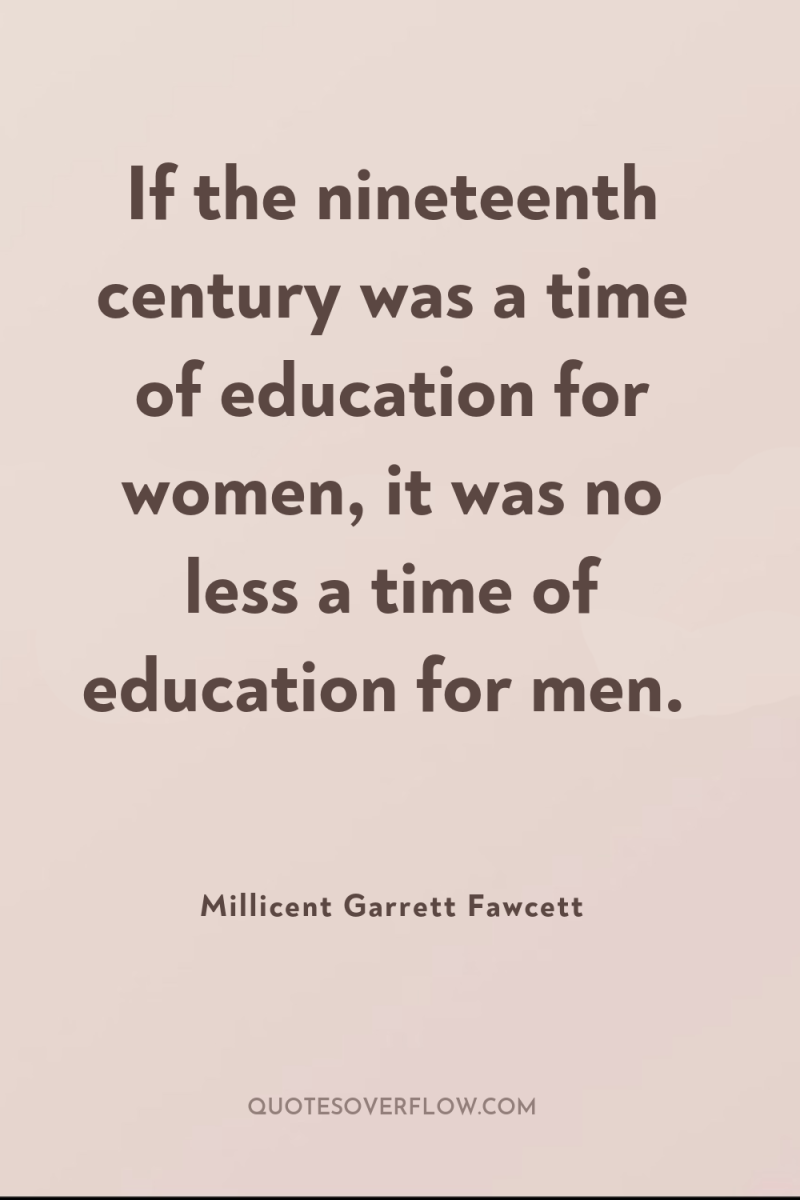
1
If the nineteenth century was a time of education for women, it was no less a time of education for men.Millicent Garrett Fawcett
2
Reading a novel after reading semiotic theory was like jogging empty-handed after jogging with hand weights. What exquisite guilt she felt, wickedly enjoying narrative! Madeleine felt safe with a nineteenth century novel. There were going to be people in it. Something was going to happen to them in a place resembling the world. Then too there were lots of weddings in Wharton and Austen. There were all kinds of irresistible gloomy men.Jeffrey Eugenides
3
She could have happily lived inside any nineteenth century novel.Kate Atkinson
4
The nineteenth century was the Age of Romanticism; for the first time in history, man stopped thinking of himself as an animal or a slave, and saw himself as a potential god. All of the cries of revolt against 'God' - De Sade, Byron's "Manfred", Schiller's "Robbers", Goethe's "Faust", Hoffmann's mad geniuses - are expressions of this new spirit. Is this why the 'spirits' decided to make a planned and consistent effort at 'communication'? It was the right moment. Man was beginning to understand himself. .Colin Wilson
5
She must not give herself up as hopeless, as many a plain girl does, scrape her hair back into an unsymmetrical bundle, have her clothes "cut out with a hatchet and put on with a pitchfork, " ill-use her skin with coarse soaps and neglect her figure. Only a beauty may dare all this, and even the loveliest cannot afford it.Mrs. C.E. Humphry
6
The nineteenth century dislike of realism is the rage of Caliban seeing his own face in a glass. The nineteenth century dislike of romanticism is the rage of Caliban not seeing his own face in a glass.Oscar Wilde
7
You were right the first time, Cathy. It was a stupid, silly story. Ridiculous! Only insane people would die for the sake of love. I'llbet you a hundred to one a woman wrote that junky romantic trash! " Just a minute ago I'd despised that author for bringing about such amiserable ending, then there I went, rushing to the defense. "T. M.Ellis could very well have been a man! Though I doubt any woman writerin the nineteenth century had much chance of being published, unlessshe used her initials, or a man's name. And why is it all men thinkeverything a woman writes is trivial or trashy-or just plain sillydrivel? Don't men have romantic notions? Don't men dream of findingthe perfect love? And it seems to me, that Raymond was far moremushy-minded than Lily!.V.C. Andrews
8
To the men and women who changed Cheryl Hersha's life, she was a continuation of the research that had first been conducted in the late nineteenth and early twentieth centuries by Dr. Morton Prince. He encountered a woman named Miss Beauchamp, a nursing student who was referred to the psychiatrist because of health problems. As he worked with her, Prince discovered that she had four separate personalities (dissociated ego states) that existed independently of one another within the same body. Though he tried, Dr. Prince never understood Miss Beauchamp, nor was he able to help her. When he died, his wife had the woman committed to an insane asylum for the rest of her life. However, Prince's careful documentation of Beauchamp's symptoms, actions and family history (extreme child abuse beginning before the age of seven) provided information needed to develop the techniques for contemporary, routinely successful treatment of what would be called Multiple Personality Disorder.Lynn Hersha